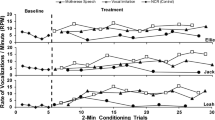Abstract
Two female infants, aged 11 and 14 months, were exposed to a procedure in which an experimenter-emitted vocal response was paired with an established form of reinforcement (positive condition). One of the subjects was also exposed to a procedure in which an experimenter-emitted vocal response was paired with a neutral stimulus (neutral condition), and a procedure in which an experimenter-emitted vocal response was paired with a mild aversive stimulus (negative condition). An AB design was used with pre- and post-pairing measures. The results showed that after the positive pairing the targeted responses increased in frequency in 75% of the sessions. Responding remained constant during the neutral condition, but dropped sharply in the negative condition. These data suggest that a critical variable related to an infant’s native language acquisition is the stimulus-stimulus pairing process that occurs when parents or caretakers speak to their infants.
Similar content being viewed by others
References
Bijou, S. W., & Baer, D. M. (1965). Child Development II: Universal stage of infancy. Englewood Cliffs, NJ: Prentice-Hall.
Brown, R. (1973). A first language: The early stages. Cambridge, MA: Harvard University Press.
Chomsky, N. (1959). A review of B. F. Skinner’s Verbal Behavior. Language, 35, 26–58.
de Villiers, J. G., & de Villiers, P. A. (1978). Language acquisition. Cambridge, MA: Harvard University Press.
Hart B., & Risley T. R. (1995). Meaningful differences. Baltimore: Paul H. Brooks.
Moerk, E. L. (1992). First language: Taught and learned. Baltimore, MD: Paul H. Brooks.
Mowrer, O. H. (1950). Learning theory and personality dynamics. New York: The Ronald Press Company.
Osgood, C. E. (1953). Method and theory in experimental psychology. New York: Oxford University Press.
Piaget, J. (1951). Play, dreams, and imitation in childhood. New York: Norton.
Pinker, S. (1994). The language instinct: How the mind creates language. New York: William Morrow & Company.
Salzinger, K. (1994). The LAD was a lady, or the mother of all language learning: A review of Moerk’s First language: Taught and learned. Journal of the Experimental Analysis of Behavior, 62, 323–329.
Savage-Rumbaugh, E. S., Murphy, J., Sevcik, R. A., Brakke, K. E., Williams., S. L., & Rumbaugh, D. M. (1993). Language comprehension in ape and child. Monographs for the Society for Research in Child Development, 58, 1–256.
Skinner, B. F. (1957). Verbal behavior. New York: Appleton-Century-Crofts,
Slobin, D. I. (1979). Psycholinguistics. Glenview, IL: Scott Foresman and Company.
Sundberg, M. L. (1996). Toward granting linguistic competence to apes: A review of Savage-Rumbaugh et al.’s Language comprehension in ape and child. Journal of the Experimental Analysis of Behavior, 65, 477–492.
Sundberg, M. L., Michael, J., Partington, J. W., & Sundberg, C. A. (1996). The role of automatic reinforcement in early language acquisition. The Analysis of Verbal Behavior, 13, 21–37.
Vaughan, M. E., & Michael, J. L. (1982). Automatic reinforcement: An important but ignored concept. Behaviorism, 10, 217–227.
Author information
Authors and Affiliations
Additional information
Portions of this paper were submitted in partial fulfillment of the requirements for a Master of Arts degree, Western Michigan University, 1983. The authors gratefully acknowledge the assistance of James W. Partington and Margaret Vaughan.
Rights and permissions
About this article
Cite this article
Smith, R., Michael, J. & Sundberg, M.L. Automatic reinforcement and automatic punishment in infant vocal behavior. Analysis Verbal Behav 13, 39–48 (1996). https://doi.org/10.1007/BF03392905
Published:
Issue Date:
DOI: https://doi.org/10.1007/BF03392905




